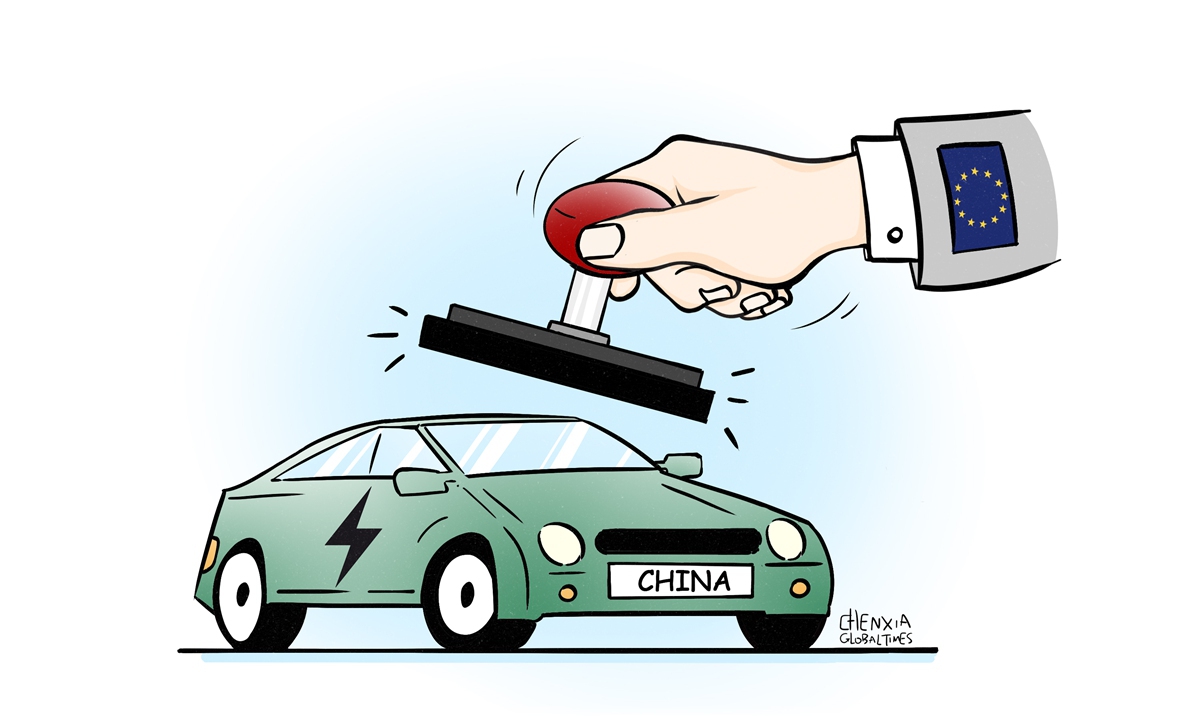
Illustration: Chen Xia/Global Times
While the impact of the EU's preliminary ruling on the anti-subsidy investigation of Chinese electric vehicles (EVs) remains unclear, the market's response has surprisingly tilted toward optimism regarding the future of Chinese EV manufacturers in Europe.
Shares in Chinese EV maker BYD surged over 6 percent before settling to a 4.15 percent gain as of the end of trading on Thursday.
An uptick like that transcends mere numerical gains - it also reflects investors' positive view of the market's potential and recognition of corporate strength. Despite the looming challenge of additional tariffs imposed by the EU on Chinese EVs, the buoyant share performance of companies like BYD underscores a strong vote of confidence from investors in the competitive prowess of the Chinese EV industry.
Such confidence is not unfounded, but rather is rooted in the persistent efforts of Chinese EV manufacturers to grow in the European market, demonstrating not only their belief in their competitive advantages but also their strategic commitment to securing a significant presence on the global stage. Despite potential economic obstacles such as tariffs, competitive Chinese EV manufacturers are still capable of overcoming these challenges in their quest to enter the European market.
It is no secret that the resilience of Chinese EV manufacturers, particularly frontrunners like BYD, is bolstered by solid foundations in technology innovation, cost efficiency and supply chain management. These companies not only excel in producing high-performance EVs but also possess significant cost advantages. This combination allows them to provide cost-competitive EVs despite facing additional tariffs, which they mitigate through internal optimization, reducing the impact on consumer prices.
Furthermore, Chinese EV manufacturers place a strong emphasis on the European market, valuing its potential over the cost increase of tariffs. As one of the leading markets for new-energy vehicles worldwide, Europe offers substantial sales opportunities and brand recognition, making it a key strategic focus for any global car company.
Therefore, despite facing potential tariff barriers, Chinese EV manufacturers are doubling down on their commitment to expand and solidify their presence in the European market. This determination is evident in their strategic moves toward enhancing their brand building, refining product lines and increasing localization efforts.
Since the EU initiated the anti-subsidy probe, Chinese EV manufacturers have proactively sought ways to mitigate challenges, including establishing factories in Europe and forging partnerships with local entities, so as to build their brands and save on shipping and potential tariffs.
For instance, after its first European factory investment, BYD is reportedly considering a second European plant in 2025. Hungary is negotiating with Great Wall Motor for its first European plant, local media reported. Chery will start production in the fourth quarter at a former Nissan facility in Barcelona, Spain with a local partner.
These initiatives are not merely reactive measures but are part of a broader, strategic approach to global expansion that Chinese EV manufacturers have adopted. Amid the complexities of globalization and shifting policies across regions, these companies have showcased their agility and commitment to long-term planning.
By enhancing their engagement with the global market and focusing on the degree of brand localization, they aim to boost consumer recognition and strengthen their competitive advantage internationally.
Thus, the EU tariff ruling, while presenting challenges, has not deterred Chinese EV manufacturers from their European market ambitions. Instead, it serves as a testament to their resilience and the robustness of their globalization strategies. Through persistent efforts to navigate policy shifts and market dynamics, Chinese EV makers are not only overcoming obstacles but also laying the groundwork for a strong international brand presence.




